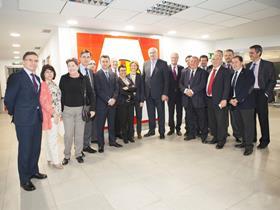
The agri-food sector, based on a strong, organised, vibrant and diverse cooperative model, has the potential to be a major driver in the EU’s economic recovery. This was the view expressed by EU Commissioner for Agriculture and Rural Development, Phil Hogan, in a speech during the Annual Congress of Spanish Cooperatives, held on 26-27 February in Valencia.
Hogan said it was vital to draw on the wealth of wisdom among Europe’s farming and agri-cooperative community to ensure that the European Commission’s agricultural policy was ambitious and efficient. Since assuming his post in November 2014, Hogan said one of his top priorities had been the simplification of the EU’s Common Agriculture Policy (CAP). Pledging to cut through excessive red tape, he promised to listen closely to farmers and cooperatives on how the policy could be improved.
“The agri-food sector is currently governed by about 200 different regulations – I have set a target to my services of reducing that to 50,” Hogan said.
Highlighting the Commission’s moves to support fruit and vegetable producers in the wake of the Russian ban, Hogan said in addition to the temporary exceptional support measures, the Commission had significantly increased the promotion budget from €60m to €200m over the next four years. “That way we can further help producers and associations in finding new alternative outlets,” he noted.
Paying tribute to the dynamism of Spanish cooperatives in opening and growing new markets from North America to the Far East, Hogan said the Commission had identified a number of market for which access would be prioritised, namely Indonesia, Brazil, Chile, Mexico and Vietnam.
Hogan also highlighted the importance of innovation to boost output and counter the effects of climate change and sustainability concerns. “The fundamental challenge we face is not only how to produce more, but how to produce better,” he pointed out. “Agriculture has always been an innovative sector. But we need to innovate more, and innovate faster, if we are to achieve our goals. The new CAP and other EU strategies will play a leading role in making this a reality. Many CAP provisions aim to encourage young innovators to see the agri-food sector as an attractive, high-tech and rewarding career. Innovative agricultural practices will also protect natural resources, biodiversity, landscape, soil and water, and increase the environmental and climate benefits that agriculture provides.”
The commissioner also stressed the need to improve the bargaining power of the cooperatives by enhancing producer organisation and cooperation throughout the food chain. Citing the Spanish Law on the Food Chain, which came into force two years ago and sets contractual rules for contracts above a certain value in which one party is an SME or economically dependent, Hogan said this and other models could be used as blueprints by other EU member states and possibly at EU level. He pledge that the Commission would make an assessment of existing national and EU work streams on unfair practices at the end of 2015, after which it would look at options for dealing with these practices.
“I Europe, we have not only excellent production conditions, but we also have excellent farmers, and we have an agri-food sector with tradition, quality, know-how and innovative ideas,” Hogan concluded. “The cooperative model is central to this. Market forecasts show that there will be a rise in consumer demand in the years ahead, in particular for high value-added products and the EU has the potential to respond to this additional demand.”



